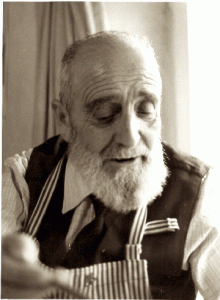The following is a story told on several occasions in Dede’s house when visitors were present and there was much sohbet and discussion about the Way. The first part I recall as being complete
 in itself as a response to some question or comment put by a European guest, and which I translated, and was referred to several times over the years. Part II I recall being told by Dede when there were Turkish dervishes or mixed company visiting, and I several years later retold the story of Part I when we were having a good time; Dede then related the story in Part II.
in itself as a response to some question or comment put by a European guest, and which I translated, and was referred to several times over the years. Part II I recall being told by Dede when there were Turkish dervishes or mixed company visiting, and I several years later retold the story of Part I when we were having a good time; Dede then related the story in Part II.
Part I
A long time ago, in a Mevlevi community (tekke), there was a certain murid of the Master Jelal, whose duty is was to collect wood from the forest for the fires of the kitchen.
Each morning he would leave for the forest and eventually return with arms full of wood he had collected – long and short, bent and gnarled, thick and thin. Time went on, and each day he would carry out his assigned task with dedication and the Holy Words upon his lips.
One day, the Shaikh (abbot) of the tekke called to the murid from his window, where he had seen the student-dervish doing his work. “Mehmet!” (or shall we call him James, John or Jethro?) called the Shaikh. “What are you carrying?” he queried. “I am bringing wood for the kitchen fires,” came the reply. The Shaikh then asked him to come closer.
“Let us see the wood,” requested the Shaikh, and the murid showed him his morning’s work. “These sticks are bent and distorted,” said the Shaikh. “But we want only straight wood for our kitchen fire. From now on when you collect your wood, you must ensure that each piece of wood is straight and not twisted as are these!”
“Eyvallah!” replied the murid, and went on about his work. From that day onward, nothing but straight wood was brought into the kitchen and used in the fire.
One day I asked my Murshid:
“What is the meaning of ‘Eyvallah‘?”
“One Eyvallah is one il’Allah,” he replied. 1976
Part II
The years passed by, and the murid grew in the Way, always carrying out his duties in the tekke with good heart. His beard had begun to turn gray and his step was slower. One day the Shaikh called him to his rooms.
“Your chille here is now finished,” he said, “and you must now leave and find your way in the world. May God guide your steps.” “Eyvallah!” replied the murid, and kissed the Shaikh’s hand in farewell.
The years passed by until one day the murid returned to the tekke. His clothes were tattered, his hair matted and his back bent. He came to the door of the Shaikh’s garden, and finding it open, entered the small courtyard. At the door he knocked, and the Shaikh’s wife came to greet him.
“My goodness, how you have changed!” she exclaimed. “I hardly recognized you!” “It has been very difficult,” he said, “but I must now see my Shaikh.” “He has gone out for a while, but will not be long. He is now nearly blind and walks with difficulty with a stick.” The murid asked her permission to sit in the sun and rest until the Shaikh’s return, then lay down and fell asleep.
A little later with a faltering stop and the tap-tap-tap of his stick, the elderly Shaikh entered his courtyard. His stick struck the sleeping murid and the Shaikh called out, “Who’s there, who is it?” The murid fell upon his face and, kissing the feet of his Shaikh, cried out with tears and pain, “O my Lord, my Master, it is I, your murid, whom you sent away those many years ago!”
The elderly man helped the murid upon his feet, kissed his cheeks and said, “Ahh, my son, come sit here and tell me.” The murid burst into tears again saying, “These years have been wretched, I am broken, there is nowhere for me in this world. God has taken away my voice, I can earn no living, and now I am old and I have nowhere to go. Please, I beg of you, allow me to come again to the tekke that I may spend my last days in peace and die here!!”
“Ahh, my son, my son,” replied the Shaikh. “Now your chille is finished, and you may go. God will make your way open.”
And the murid left again, but now his voice returned. Eventually he became one of the great preachers of God’s Holy Word and lived in the Light for many years.
Cillemiz hic bitmiyor. Biterken gine baslior.
“Our training has no end. In our end is our beginning.”– Sufi saying

